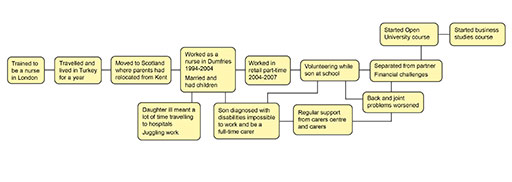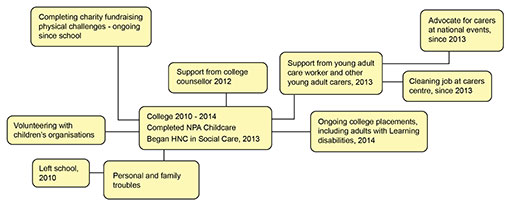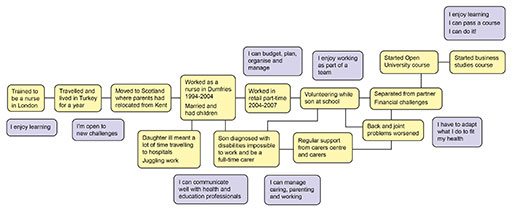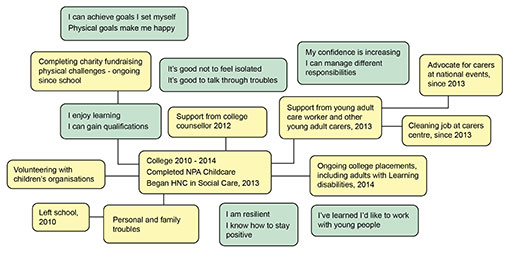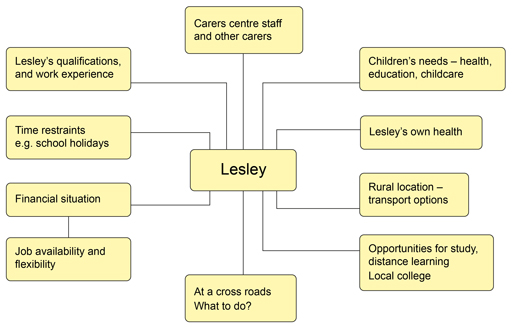Use 'Print preview' to check the number of pages and printer settings.
Print functionality varies between browsers.
Printable page generated Thursday, 5 March 2026, 4:12 AM
Session 2: Learning by looking at my life over time
Introduction
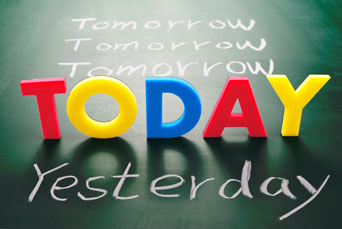
What can we learn by looking at our life, our experiences, over time? How can this be helpful for the future?
Session 1 was about looking at yourself in your present situation. However, the person you are now is partly a result of everything that has happened to you in the past: who you were with, where you have been, what you have done and all the events that have affected your life.
We learn from good and bad experiences and the ups and downs of life, but some people may have had extreme events in their life that would be distressing to revisit. If this is the case for you, choose to focus on areas of your life that you’re happy to spend time thinking about.
Your experience of caring is likely to have a strong influence over your present situation. Your caring role may be something that developed over time and perhaps like Jade and Dean you didn’t really realise you had this ‘label’, it’s just something that’s normal to you. For others, becoming a carer might have been a sudden event. Whatever your situation, you will know that circumstances can change quickly and sometimes things happen that you don’t have control over.
The value of looking at our roles and experiences, and recognising the influences on our lives, is that we can identify what really interests and motivates us and start to understand our decision making and how we react to events. Is there a pattern? What we consider important can change over time: our priorities can differ at different points of our life. How we feel about these experiences can vary too.
So, how do we define high points and low points? Are there recurring themes in the choices we make? Can we see the difference between choices that we make and changes that happen that are out of our control?
In this session you are asked to look at your life experiences, focusing particularly on your caring experiences. The aim is to work out what skills and abilities you have built up, together with the qualities you have developed, particularly from caring, in addition to the obvious ones you have gained from education or work experience.
Learning outcomes
After working through this session you will have:
a clearer understanding of the experiences that carers could reflect on, including their roles, actions and decisions
an appreciation of personal qualities developed through a caring role
the ability to use information technology (IT) to carry out reflective activities in writing and communicating
the ability to explore and use new ways of expressing ideas.
Taking stock of my experiences over time
A timeline creates a graphic picture of your life (or a period in your life) that will help you to identify the ups and downs, and also any patterns or recurring themes that you may not be aware of.
It can be very difficult to look back over our life or our experiences; for some people, this may bring to mind some issues or memories that they would rather not confront. If you find this activity distressing, you may want to omit it or discuss it with someone you trust. Remember, you can also select which areas of your life you want to focus on. In this section we have created carers’ timelines using the website bubbl.us.
In Activity 2.2 we suggest you may like to use this website to create your own timeline. Note, however, that although bubbl.us is free, users are required to sign for an account. (Bubbl.us is not an Open University website and the OU is not responsible for third party websites such as this or the information you choose to share with them.)
Bubbl.us has instructions on how to use this free online tool. If you’d rather not use this resource don’t worry, pen and paper will do just as well. You might have other ideas of how to create a timeline.
Before you create your own timeline, look at examples of other carers’ timelines.
Lesley’s timeline begins when she starts her career as a nurse. The first few bubbles illustrate positive experiences occurring over time (left to right) as she gains experience and progresses in her career.
Then Lesley’s life becomes more complicated. She is married and has children, but is also reacting to some new and difficult challenges. These are shown below the centre line.
The last part of this timeline shows how difficult experiences are happening almost at the same time as positive events. Lesley is still a carer, with her own health problems and financial challenges, but she also has some ‘ups’. She has been able to make her own choices and enjoy new challenges including completing an Open University course and starting a business studies course. Timelines don’t always progress in ups and downs. Sometimes ups and downs can be happening at the same time, as these boxes show.
Now have a look at Scott’s timeline.
Scott left school and started college, which he continues to enjoy. College is an ‘up’ compared to school, so college is positioned slightly higher. While at school and then starting out at college he had some difficult personal and family times. This box is lower indicating a ‘down’.
Throughout these personal challenges Scott continued to make progress with his studies, moving from few qualifications via a National Progression Award (NPA) in Childcare to working on a Higher National Certificate (HNC) in Social Care. This large middle box shows this experience is still continuing.
The volunteering and fundraising boxes are ‘ups’ that he often chooses to do.
The support he gained from a college counsellor and the young adult carers support worker and other carers have been high points and these points in his timeline have led to further positive experiences as the boxes show by moving up and to the right.
Activity 2.1
Activity 2.1 Taking stock of my experiences over time
Make some notes (either in your notebook or Activity 2.1 of your Reflection Log) on the questions below. You can also write your notes in this document, but don’t forget to save it.
Everyone’s ups and downs are different.
- Do you have anything in common with Lesley’s experiences?
- Do you have anything in common with Scott’s experiences?
- What is different about your experiences?
- What period of your life would you like to reflect on and put into a timeline?
If you are working in a group, or with a mentor, you might want to share your answers and discuss your notes with each other.
Activity 2.2
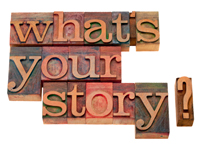
Activity 2.2 My timeline
Having looked at the examples try drawing your own timeline.
The actual timeframe will be up to you – it can include your whole life since childhood, or you might want to focus on recent study or work experience or look at your experience of life as a carer.
Go to Activity 2.2 in your Reflection Log. Once you have completed your activity, make sure you save the document again. Or you can use this document to plot your timeline, but don’t forget to save it.
You may have other ways of representing your timeline. What is important in this activity is the information or understanding from your experience that is brought to mind. So, if you prefer, you can simply make a list of the high points and low points of the period of your life and reflect on these.
You could also use the drawing tools available in most word processing programmes to produce your timeline. If you’d like to look at further IT options, you can use a free online software programme (for example, bubbl.us) to create images like the ones included in this course. Note that although bubbl.us is free, users are required to sign for an account. If you choose to use bubbl.us, click on Learn more to see how to get started. (Bubbl.us is not an Open University website and the OU is not responsible for third party websites such as this or the information you choose to share with them.)
If you prefer not to use bubbl.us, or any other online tool, don’t worry – pen and paper will do just as well!
Remember, it’s up to you what you want to include and the timeframe you want to focus on – your whole life, or a specific period. Try to put low points lower down the page and high points above them, just as Lesley and Scott have done, but if your life has fewer ups and downs then just list them side by side. You do not need to include anything that you want to keep private.
If you are working in a group, or with a mentor, you might want to share and discuss your timeline in whatever format you’ve created it.
Learning from experience
From plotting what happened when, the next step is thinking about what you’ve learned from these different roles and experiences, and how you’ve developed as a person over time.
Look at Lesley’s timeline again but with some key learning points added.
The purple boxes summarise what Lesley has learned at different points in her life. The early part of her timeline shows that she enjoyed learning and was good with new challenges.
The middle, challenging, section of her timeline has produced a lot of different learning points relating to her caring role and her experience as a parent.
In the final section we can see that Lesley still enjoys learning. She has gained confidence from appreciating that she can succeed with a course.
Listen to Lesley talking about what she has learned.
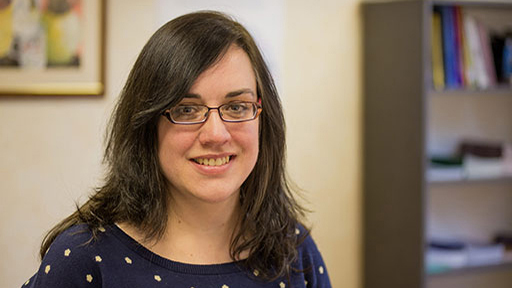
Transcript
Activity 2.3
You have heard Lesley talking about what she has learned from the different roles, environments and situations she has been in.
Here are some key words from Lesley’s comments:
By reflecting on her experience Lesley has learned that she is resilient; she can manage her time; she can budget and manage stress. She knows that she is capable of learning new things and coping with difficult situations and that she can communicate well.
Activity 2.3 Learning from experience
Go to Activity 2.3 in your Reflection Log. Once you have completed the activity make sure you save the document again.
Think about the following questions and make some notes in your notebook or Reflection Log. Alternatively, you can use this document but don’t forget to save it.
- Was some of Lesley’s learning unexpected?
- Did she learn from difficult times as well as good ones?
- Did Lesley learn things while caring that will be useful in studying and employment?
Learning points
Now look again at Scott’s timeline, which also has learning points added.
Scott’s learning points are linked to different areas of life, as well as over time. Very early on he realised that he enjoys learning and that gaining qualifications brings confidence.
He made it through some tough personal experiences and family troubles, and feels proud to have got through these difficult times. This made Scott feel resilient and he has learned how to look on the positive side of life.
Gaining support from the young adult carers group was a very positive experience. Scott learned that it was not good for him to stay isolated, and that being part of a supportive group has helped him develop his confidence. He has learned that his well-being is also supported by setting and achieving the physical goals of fundraising activities. These three boxes are part of Scott’s ‘ups’.
Listen to what Scott says about what he has learned from experience.

Transcript
Through reflecting on his experiences Scott realised that he applied his skills and personal qualities to manage his caring and studying responsibilities.
Here are some key comments from Scott’s story:
- had very poor mental well-being for a while
- managed to keep going with his studying and caring
- benefited from the support from other young adult carers
- tries to focus on the positive as much as possible.
Scott now has:
- grown in confidence
- recognises his own resilience and coping skills
- an understanding of what he’d like to achieve and how to get there.
We all experience ups and downs in life: good points and bad points. There may be positive and negative outcomes from each experience as Lesley and Scott’s experiences show.
Whatever our experience, we are learning all the time. Learning is not something that stops when we leave childhood behind. Learning is lifelong. Some learning is about ourselves, the type of person we are, and our strengths and qualities; other learning is about skills, qualifications, understanding ideas and concepts, or the society we live in.
Can you identify what you have learned from looking at your own experience as a carer?
Everyone’s experience will be different. There is no right or wrong answer.
Activity 2.4
Activity 2.4 Learning from my experience
Look at your timeline again and think about what you have learned from your experiences. Looking over the ups and downs, does it help you to recall how you felt at each point? What did you learn from each situation? Perhaps you found out more about your individual qualities and your ability to just keep going: qualities such as resilience, adaptability or reliability?
You can add your learning points to your timeline in a different colour. Add your new image to your Reflection Log.
If you’re using pen and paper or a word processing document, go to your Reflection Log and add your learning points to the timeline that you created in Activity 2.2. Make sure you save the document again. You can also complete the table using this document, but don’t forget to save it.
If you’re working with a group, you can share and discuss your learning points with others if you’d like to.
Looking backwards, looking forwards
You have been looking back at your life experiences, or at a period in your life. Lesley’s timeline showed that there are ups and downs, and that a number of factors have influenced her life. While she has control over some things, such as choosing nursing, or choosing to live in Scotland, other factors, like her son’s disabilities or her own back problems, are outside her control.
In the next session you will be looking forward, and exploring factors that influence the choices you might make about your future. It is useful to think about what has influence over you and whether it’s something you can control or not.
Later in the course you’ll think about your support network and what might help or hinder you in achieving your goals. Understanding the things you can change, and the things you have to work around, will help you plan your next steps and find support for achieving them.
To start you thinking about the factors that influence your life, have a look at Figure 2.7. This is a spider diagram (sometimes also called a ‘mind map’) and it is a way of showing connections.
Activity 2.5
Activity 2.5 Influences and choices
Try creating an influences and choices spider diagram for yourself, either on paper or using an online tool like bubbl.us. Please see Activity 2.2 for a note on using bubbl.us. If you prefer not to use this, don’t worry – pen and paper will do just as well.
Go to Activity 2.5 of your Reflection Log. Once you have completed the activity, make sure you save the document again.
Summary
In Session 1 you started to look at your own roles, skills and qualities. The key point here was that by reflecting on our experiences, we learn something from them that helps us to move on.
Session 2 has shown how drawing a timeline is useful for plotting what happened and when, so that we can reflect on how we feel about these experiences; what we have learned from them, and how they have helped to shape us as a person.
Have the activities been useful? Did you learn anything new from creating your timeline that you hadn’t noticed before?
If you would like to spend more time thinking about timelines, view The Open University’s example of how to create a timeline on the OU Careers pages.
You have now completed Session 2 but will explore these ideas further in Session 3.
Acknowledgements
This course was written by Lindsay Hewitt, Sarah Burton and Julie Robson.
Except for third party materials and otherwise stated (see terms and conditions), this content is made available under a Creative Commons Attribution-NonCommercial-ShareAlike 4.0 Licence.
The material acknowledged below is Proprietary and used under licence (not subject to Creative Commons Licence). Grateful acknowledgement is made to the following sources for permission to reproduce material in this unit:
Images
Figure 2.1: © Revensis/Dreamstime.com
Figure 2.4: Marek Uliasz/Dreamstime.com
Every effort has been made to contact copyright owners. If any have been inadvertently overlooked, the publishers will be pleased to make the necessary arrangements at the first opportunity.
Don't miss out:
1. Join over 200,000 students, currently studying with The Open University – http://www.open.ac.uk/ choose/ ou/ open-content
2. Enjoyed this? Find out more about this topic or browse all our free course materials on OpenLearn – http://www.open.edu/ openlearn/
3. Outside the UK? We have students in over a hundred countries studying online qualifications – http://www.openuniversity.edu/ – including an MBA at our triple accredited Business School.
